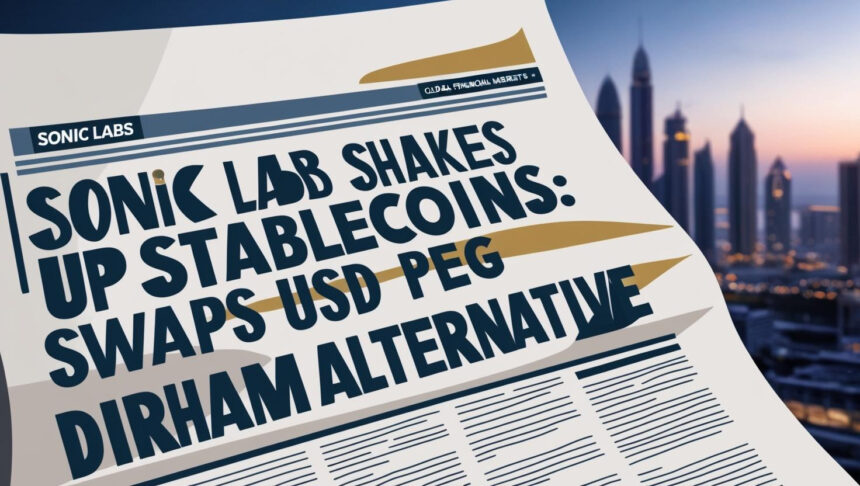Swaps USD Peg for UAE Dirham Alternative
In a surprising twist, Sonic Labs, the blockchain venture co-founded by DeFi heavyweight Andre Cronje, has pivoted away from its planned USD-pegged algorithmic stablecoin. Instead, the company is embracing the United Arab Emirates dirham (AED) as the backbone for its new stablecoin initiative.
Why the sudden change? Let’s dive into the details of this unexpected move and why it could reshape the stablecoin landscape.
💸 From USD to AED: The Big Switch-Up
Just a few weeks ago, Sonic Labs was gearing up to launch an ambitious USD-backed algorithmic stablecoin. The project, originally announced on March 22, 2025, boasted an eye-catching 23% APR—a number that had DeFi enthusiasts buzzing.
But then, on March 28, Andre Cronje made a sharp U-turn.
“We will no longer be releasing a USD-based algorithmic stablecoin… we will be releasing a mathematically bound numerical Dirham which is settled and denominated in USD,” Cronje revealed.
Translation? Instead of an algorithmic stablecoin pegged to the U.S. dollar, Sonic Labs is shifting focus to a dirham-denominated alternative, seemingly aligning itself with the UAE’s growing digital finance ambitions.
🏦 The UAE’s Bold Crypto Moves & Sonic’s Perfect Timing
The UAE has been making waves in the blockchain and fintech sectors, positioning itself as a global crypto hub. A major part of that strategy? The upcoming launch of a blockchain-based digital dirham (CBDC) in Q4 2025.
Central Bank Governor Khaled Mohamed Balama has emphasized that the digital dirham will enhance financial stability and combat financial crime—making it a secure, regulated, and government-backed alternative to algorithmic stablecoins.
By pivoting to an AED-based solution, Sonic Labs could be setting itself up for a regulatory green light in a country that’s rapidly becoming a leader in blockchain innovation.
🚨 The Algorithmic Stablecoin Dilemma
Sonic Labs’ move away from an algorithmic USD stablecoin is hardly surprising. History hasn’t been kind to algorithmic stablecoins—just ask anyone who lost money in the 2022 TerraUSD (UST) collapse.
That disaster wiped out billions of dollars and cast a long shadow over algorithmic stablecoins, which use smart contracts instead of traditional reserves to maintain their value. Even Cronje himself has admitted he was never fully convinced about them.
By shifting to a dirham-based model, Sonic Labs seems to be avoiding the pitfalls that doomed projects like Terra while tapping into a more stable and regulated financial environment.
📢 Crypto Twitter Reacts: “Bold Move or Smart Play?”
As always, Crypto Twitter had a lot to say:
🔹 “This could be HUGE. The UAE is leading the way in blockchain adoption!” 🔹 “Algorithmic stablecoins are dead. Cronje knows this. Good move.” 🔹 “But why still settle in USD? Just go full AED!”
While some hail it as a forward-thinking strategy, others are questioning whether it fully embraces decentralization. Either way, Sonic Labs has people talking—and that’s never a bad thing in crypto.
🌍 What This Means for the Future of Stablecoins
Sonic Labs’ pivot underscores a major trend in crypto:
📌 Regulation is King – The wild days of algorithmic stablecoins may be fading, replaced by more government-aligned, compliant alternatives. 📌 The UAE is Becoming a Fintech Powerhouse – With its pro-crypto policies and upcoming digital dirham, the country could become a major hub for next-gen stablecoins. 📌 Investors Are Looking for Stability – After multiple high-profile collapses, users and institutions are demanding safer and more transparent stablecoins.
Could Sonic Labs be setting the stage for a new wave of stablecoins backed by national currencies rather than volatile, algorithmic mechanics? Only time will tell.
🔮 The Bottom Line
Sonic Labs has just thrown a curveball into the stablecoin game, ditching a risky algorithmic model in favor of a dirham-based alternative with strong regulatory backing.
Will this move pay off? Will it set the tone for future stablecoins? One thing’s for sure—crypto never stays boring for long. 🚀























